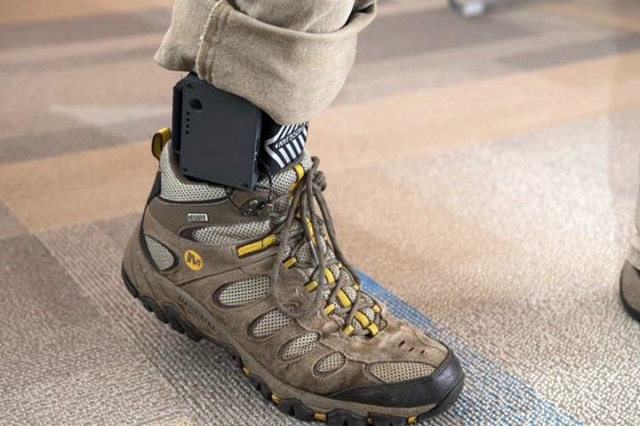
The VibeForward device attaches to the foot or ankle and provides vibrations to help people with Parkinson’s disease walk (Kathy Atkinson, University of Delaware)
4 Mar. 2019. A spin-off enterprise from University of Delaware is developing an electronic vibrating device that fits on the feet or ankles of people with Parkinson’s disease to help them walk. The Michael J. Fox Foundation for Parkinson’s Research awarded $440,000 to help develop and test the feasibility of the VibeForward device made by start-up company Resonate Forward LLC in Newark , Delaware for people with Parkinson’s disease.
Resonate Forward licenses research from the university’s engineering department and nursing school that developed a prototype PD Shoe, an ordinary beach shoe outfitted with sensors and vibration mechanism for people with Parkinson’s disease. Parkinson’s disease occurs when the brain produces less of the amino acid dopamine, a neurotransmitter that sends signals from one neuron or nerve cell to another. As the level of dopamine lowers, people with Parkinson’s disease become less able to control their bodily movements and emotions.
Many people with Parkinson’s disease face the problem of a frozen gait that stops an individual from walking, despite the person’s intention. The problem is responsible for immobility for a few seconds to minutes at a time, as well as falls and injuries. The university cites data showing as many as 60 percent of people with Parkinson’s disease experience frozen gait. Earlier pilot studies by Ingrid Pretzer-Aboff, a professor of nursing at Delaware — now at Virginia Commonwealth University in Richmond — and others found that vibrations from the PD Shoe sent to the feet reduced incidents of frozen gait in people with Parkinson’s disease.
Resonate Forward is developing a commercial product refining the electronics in the PD Shoe. Richard Martin, an electrical engineering professor at Delaware and the company’s chief technology officer, recruited Theodore Fleck, an undergraduate engineering student for the project. Martin and Fleck are consolidating the sensors and vibrating mechanism into a small, self-contained VibeForward unit that fits on the foot and works with the patients’ own footwear.
The sensors, including an accelerometer, detect when frozen gait occurs, then trigger vibrations to help make walking smoother and easier for the wearer. “Potentially, you could know when a person is standing but not moving based on data from the pressure sensors,” says Martin in a university statement.
Among the enhancements in development for VibeForward are better communications with a smartphone app and web interface that can track the individual with the device, in case the person needs help. The connections also enable collecting data from devices over time, which can then eventually be analyzed with machine learning to further personalize the device.
The $440,000 grant is one of several awards made last month by Michael J. Fox Foundation for non-pharmacological solutions for gait and balance issues, which the foundation says are among the most under-addressed problems facing people with Parkinson’s disease. The grant supports research by Pretzer-Aboff and Virginia Commonwealth neurologist Leslie Cloud to determine the optimum vibration dose for the VibeForward device, and assess the device’s feasibility in an early-stage clinical trial.
Resonate Forward was founded in 2016, and received seed funding from university’s Blue Hen proof-of-concept program for technology commercialization and the Delaware Established Program to Stimulate Competitive Research, or Epscor. The company also took part in National Science Foundation’s Innovation Corps training program held on the Delaware campus.
More from Science & Enterprise:
- Prosthetic Hand Gives Better Sense of Position, Movement
- Non-Invasive Brain Stimulation Adapted for Epilepsy
- Wearables Assessed for Clinical Trial Value
- Univ. Spin-Off Creates Concussion Detection App
- FDA Clears Inhaled Parkinson’s Drug
* * *

 RSS - Posts
RSS - Posts
[…] Fox Foundation Supports Parkinson’s Walking Device […]